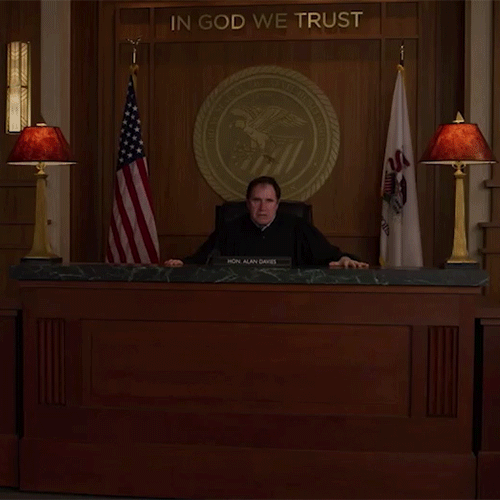
How much you enjoy “The One Inspired by Roy Cohn” rests almost entirely on how much you’re into whatever the hell Michael Sheen is doing as Roland Blum, the boorish and ethically compromised lawyer who acts as Maia’s co-counsel on a murder trial. Sheen is meant to evoke Roy Cohn, the notorious lawyer and fixer whose career highlights include prosecuting the Rosenbergs for espionage, serving as Joseph McCarthy’s chief counsel during the Red Scare, and serving as a mentor and personal attorney for one Mr. Donald J. Trump. Sheen projects Cohn’s ferociousness and his utterly unscrupulous devotion to winning at all costs, but the performance is robust to the extreme, resembling Alfred Molina’s coked-out dealer in Boogie Nights. (There’s even the same foreground/background tension between him and an unclothed Asian man in the back corner of the frame at one point.)
Much of the Blum’s philosophizing comes from Cohn by way of Trump, with sleazy nuggets of wisdom like, “There can be beauty in a well-told lie,” or, “You never, ever apologize.” But Sheen and the script, by veteran TV writer (and Bad Lieutenant: Port of Call New Orleans screenwriter) William M. Finkelstein, uncork a much wilder, hammier cartoon version of the real thing. He steamrolls over Rose Leslie’s Maia — or, at least, tests her meddle, given how much she’s had to assert herself as a young associate at a firm that occasionally forgets she exists. And he steamrolls over the other characters, too, prowling around the courtroom like a feral animal, presumably believing that a jury might interpret the ensuing chaos as cause for reasonable doubt. I don’t have the legal experience to say whether a lawyer could get away with, say, accusing the opposing counsel of murder or offering a pile of takeout menus as an evidentiary exhibit, but it certainly seems like disorder in the court.
It’s here that we run into the only persistent problem with The Good Fight: It can be exuberant to a fault. Since The Good Wife took much of its core team to CBS All Access for The Good Fight, the basic dynamics of the show have remained the same — lively, topical, irreverent, with great lead performances and character turns galore — but greatly amplified. There’s more salty language, more political provocation, more outrageous turns of the plot, more everything. This has mostly been a wonderful, liberating development, leading to wacky developments like Diane’s micro-dosing habit or the animated Jonathan Coulton explainer-ditties or a subplot on the pee tape. Sheen is right on that line between the sublime and the ridiculous for me, gobbling up so much scenery that it’s hard to even remember what else happens in the episode — or, more crucially, what is happening in the case he and Maia are working together. He throws her trial notes out the window. He gives her a fentanyl lollipop. He offers a revolting motivational speech. (“You walk into court tomorrow morning with dope-pinned eyeballs, a wet pussy, and Roy Cohn in your heart, there’s no one who can touch you.”) But it’s hard to sort out what he’s actually accomplishing.
There’s reason to believe that, long-term, the showrunners know what they’re doing with Sheen, who represents a more impish version of a win-at-all-costs type like Cohn or Roger Stone. He doesn’t have any ethical hang-ups about procedure: Winning a case isn’t about the methodical business of supporting a claim with evidence, but about storytelling. The person who tells the best story, no matter its casual relationship to the facts, will win over the jury. And should anyone call him out on his corruption, he’s got plenty of dirty tricks to keep them in line, like threatening Maia with a purloined hospice care kit that he’s left in her possession. He knows how to neutralize his enemies and muzzle his critics.
Blum’s efforts to undercut Maia inside and outside the courtroom echo another conflict within Reddick, Boseman & Lockhart where the women fight to make their voices heard. The firm has been looking to beef up its matrimonial arm, which has been such a promising track for lawyers in the past that Lucca is initially reluctant to heed the partners’ call to get more involved. But when Julius recruits another conservative black lawyer from another firm to head up the divorce division, the move rankles Lucca enough to where she aggressively pursues the role for herself. She’s turned off by the smug confidence of Julius’s recruit and the boys’-club secret-handshake quality of his candidacy, and she doesn’t like that he represents disproportionately male clients, too.
Lucca scrambles to get the job, both by making clients out of Francesca’s wealthy “see and sip” friends — Francesca explains that a “see and sip” involves seeing the baby, and sipping mint juleps until they’re drunk — and by deploying Marissa to get the dirt on her rival, who it turns out served as an adviser to Brett Kavanaugh on his Supreme Court hearings. That last detail is unsavory enough to tip the board in Lucca’s favor, but it also becomes about redressing the balance at the firm itself. Liz and Diane want more women in top positions at Reddick, Boseman & Lockhart, and they leverage their considerable power to make it happen. Adrian recognizes the move for what it is — and the tactical underhandedness that made it happen — but there’s nothing he can do about it. The women in the firm are determined to change its culture, particularly after the revelations about Carl Reddick’s years of sexual misconduct, and they’ll fight as dirty as necessary to get it done.
Hearsay:
• For all of Michael Sheen’s wild gesticulating in the courtroom, Richard Kind’s performance as the exasperated judge got the biggest laughs from me. (“In a week I’m going to Santa Fe, where I’ll be visiting a spa and I’ll be wearing nothing but a towel and a mud mask.”) It’s a tribute to his standout talent that Kind rubbing his forehead in despair wins “GIF of the Week” over Diane throwing axes:
• Diane does indeed throw axes. She cannot escape the Trumpism that infiltrates every corner of her life. Kurt has gone on safari with Trump’s Large Adult Sons, who appear to have been more interested in bagging a giraffe than taking him to the hospital with buckshot wounds. He also appears to be the beneficiary of their influence in scoring a job in the VA. Diane is hearing more from porn star Tara Strokes, whose story about Trump paying for her abortion has been leaked to the media. And when Diane goes to her Aikido class to blow off steam, her teacher quietly drops “George Soros and the Jewish conspiracy to control the media” into the list of worldly troubles she must purge from her mind. She hasn’t been micro-dosing hallucinogens this season, but she’s on an odyssey all the same.
• Michael Sheen is doing an awful lot of work to play what is naturally a Jason Mantzoukas character.
• The writer of this episode, William Finkelstein, collected a number of Emmy nominations (and two wins) for his work as a writer and producer on L.A. Law, but he should be proudest of his script for Werner Herzog’s Bad Lieutenant: Port of Call New Orleans. Going to guess iguana-cam wasn’t Finkelstein’s idea.
• Maia’s new sunglasses have given her a kind of superheroic ruthlessness. Without the glasses, she struggles to explain to one of her father’s ex-clients that she’s not responsible for his losses. With the glasses, she can say, “What the fuck do I care?”



